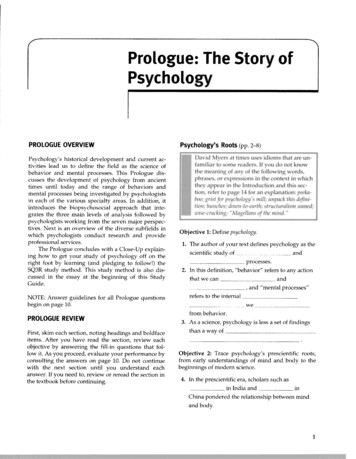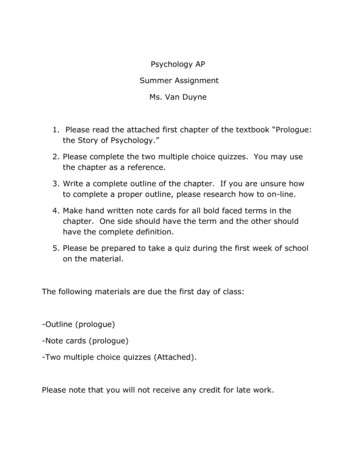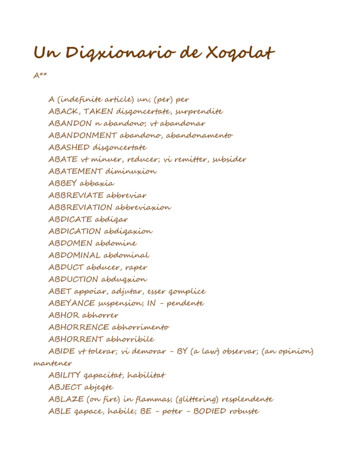
Transcription
Introduction to n to Psychology
Table of ContentsIntroduction. 5Early Systems of Psychology. 6Perspectives. 6History. 8Early development. 8Early modern era. 8Modern era. 9Biological basis of behavior. 11Neurons. 11The Transmission of the Signal.11Synapse.11Neurotransmitter.11Resting Potential. 12Action potential.12Refractory Phase. 12Signal Strength. 12Organization of the nervous system.12The Central nervous system. 12The peripheral nervous system. 13The glandular systems. 13Exocrine glands.13Endocrine glands.13Structure and function of the brain. 13Hindbrain. 13Midbrain.13Forebrain. 14Methods for observing or evaluating brain activity.14Footnotes.14Related Articles.14Sensation and Perception.15Sensation and Perception. 15How many senses are there?. 15Sensory receptors. 15Gestalt Effect. 15States of Consciousness.16Human Development.17Structure and Function of DNA. 17Natural Selection in Behavioral Traits. 17Piaget's Theory of Cognitive Development. 17The Nature-Nurture Controversy.17Learning.19Memory. 20Language and Cognition.21Motivation and Emotion.22Personality. 23Intelligence. 24IQ. 24Theories of Intelligence. 24One Thing or Many?. 24Assessment of Intelligence. 24
The Bell Curve. 24The Flynn Effect. 24Cultural Biases in Intelligence Testing. 24Herrnstein and Murray's Bell Curve. 24Psychological Disorders. 25What Is Abnormal?. 25The diagnostic systems. 25What is the diagnostic systems?.25Types of Disorders. 25Disorders Diagnosed in Early Childhood. 25A.D.H.D. 25Tic Disorders.25Tourette's Syndrome.25Anxiety Disorders. 26Phobias. 26Panic Atacks. 26Obsessive Compulsive Disorder. 26Psychotic Disorders. 26Schizophrenia.26Sexual Disorders. 27Paraphilias. 27Drug Related Disorders. 27Addiction And Dependance. 27Developmental Disorders. 27Autism. 27Asperger's Syndrome. 27Personality Disorders. 27Psychotherapy and Intervention. 28Branches of Psychology. 29Abnormal Psychology.29Biopsychology. 29Behavior Analysis. 29Clinical Psychology. 29Counselling. 30Cognitive Psychology. 30Developmental Psychology. 31Educational Psychology.31Evolutionary Psychology. 31Experimental Psychology. 32Forensic Psychology. 32Psychology and Law. 32Health Psychology. 32Neuropsychology. 32Industrial-Organizational Psychology. 33Personality Psychology.33Social Psychology.34Judgment and Decision Making. 34Psycholinguistics. 34Social Psychology. 35Psychophysics.
Evolutionary psychology is a theoretical approach to psychology that attempts to explain certain mental and psychological traits such as memory, perception, or language as evolved adaptations, i.e., as the functional products of natural or sexual selection.











